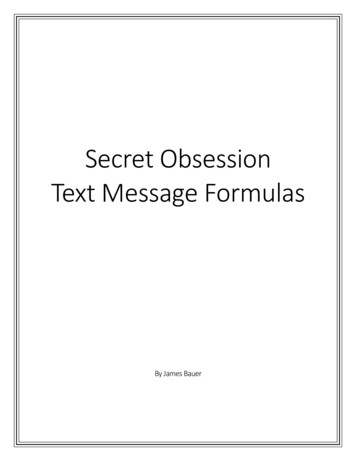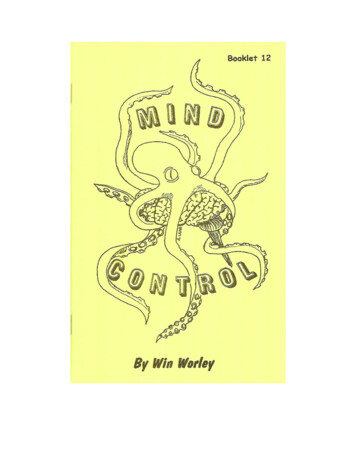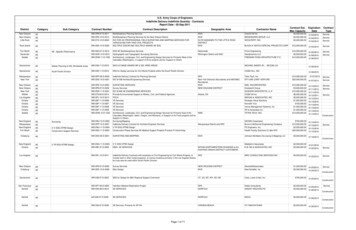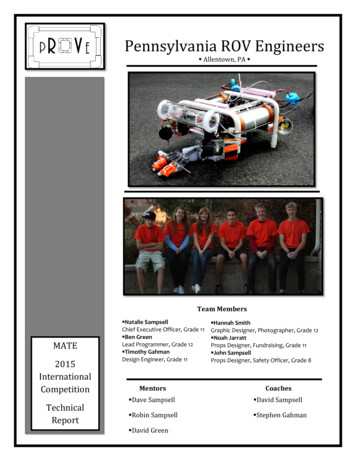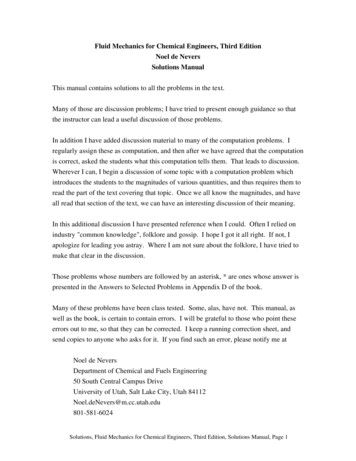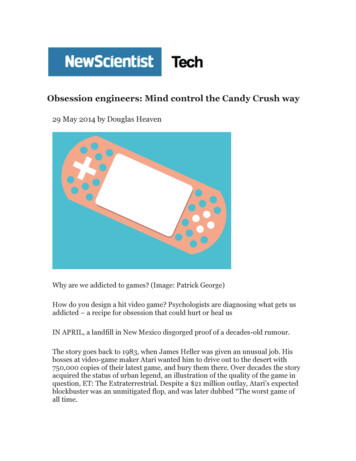
Transcription
Obsession engineers: Mind control the Candy Crush way29 May 2014 by Douglas HeavenWhy are we addicted to games? (Image: Patrick George)How do you design a hit video game? Psychologists are diagnosing what gets usaddicted – a recipe for obsession that could hurt or heal usIN APRIL, a landfill in New Mexico disgorged proof of a decades-old rumour.The story goes back to 1983, when James Heller was given an unusual job. Hisbosses at video-game maker Atari wanted him to drive out to the desert with750,000 copies of their latest game, and bury them there. Over decades the storyacquired the status of urban legend, an illustration of the quality of the game inquestion, ET: The Extraterrestrial. Despite a 21 million outlay, Atari's expectedblockbuster was an unmitigated flop, and was later dubbed “The worst game ofall time.
Now consider Flappy Bird, a game that, despite having been created by a singledeveloper in a couple of days, became an accidental global obsession. At its peakearlier this year, Flappy Bird was being played by so many people on their phonesthat Dong Nguyen was making 50,000 a day. "Flappy Bird was designed to playin a few minutes when you are relaxed," he said at the time. But things took adark turn. People became so obsessed with the game that they showered Nguyenwith angry abuse online. In the end it was too much for him. Nguyen withdrewFlappy Bird from public circulation.It has never been possible to know ahead of time whether your painstakinglycrafted game will soar to the heights of Flappy Bird or require desert burial.Game designers relied on a combination of intuition, sheer luck and years of toil and have often been taken by surprise by the runaway success of their owngames. But that's all about to change. Although game science is in its infancy, it isalready feeding insights from psychology back into design to produce what lookslike very much like a recipe for obsession. It has attracted the attention ofinterests beyond the gaming industry.Will they use it to hurt us - or help us?We have been aware of some basic ingredients of habit-forming games since atleast the 1990s. That could explain the similarity of so many popular puzzlegames like Tetris, Bejeweled and Puyo Puyo: random shapes appear on a screenthat the player must match up with complementary shapes to clear the board andscore points.Rearranging these shapes is undeniably, deeply, satisfying.But why? The psychological underpinnings have only recently begun to beexamined in any detail. Many researchers have suggested that a love of matchingpatterns taps into a basic human compulsion, giving the same fix we get as aninfant pushing shaped blocks into their corresponding holes. "It's hard-wired inour brain to organise things," says Angelica Ortiz de Gortari at Nottingham TrentUniversity, UK.Perhaps no game has harnessed psychology as deftly as Candy Crush Saga. Itsbasic construction is familiar: presented with a grid full of colourful "candies",you line up at least three matching sets in a row to meet different targets andprogress to subsequent levels. Unlike some other puzzle games, Candy Crush hasbecome an instant, unstoppable juggernaut and a pop culture phenomenon.Since its introduction two years ago, the game has become the focus of obsessiveanalysis and sordid confessions. Journalists have openly declared themselvesaddicts, with more than a few admitting they have paid extravagant sums to play.
They played on the train, at work, at weddings, while driving and duringbathroom breaks (according to one anonymous web confessor, when she finallygot off the toilet after 4 hours of play, her legs collapsed beneath her).This is no niche market; no group seems immune to its charms. So what didCandy Crush get so right?Its designers appear to have hit upon a formula that's beginning to emerge fromthe academic discipline of game studies as the "ludic loop". Ludic loops are tight,pleasurable feedback loops that stimulate repetitive, if not compulsive,behaviour. "It definitely takes us back to behaviourist psychology," says NatashaDow Schüll at the Massachusetts Institute of Technology, whose research ongames anthropology led her to study this phenomenon in popular gaming.Her formulation has come largely from her studies of slot machines and theirallure to addicts. Slot machines perfectly illustrate the concept of the ludic loop.They lure people into short cycles of repeated actions using tricks familiar tobehavioural psychologists: you do something, the machine responds with lights,jingling sounds and occasionally cash rewards. You do it again. And again, andagain.Our affinity for this kind of activity is typically ascribed to dopamine, a brainsignalling chemical that has been the source of much confusion about the linksbetween addiction, reward, gambling and gaming. Dopamine was long thought tobe a simple reward or pleasure chemical, but the last decade has broughtevidence that its action in the brain is in fact much more subtle. It is linked to thecompulsion to repeat an activity, whether or not that activity is pleasurable(Behavioral Neuroscience, vol 119, p 5).That would explain the appeal of slot machines, which beget compulsivebehaviour despite offering virtually no chance of a tangible long-term reward.Beneath the obvious blinking lights, Schüll thinks, the real draw of the slotmachine - and all ludic loops - is a constant, repetitive switching betweencertainty and uncertainty. A moment of uncertainty opens up as the symbols whirinexorably toward resolution. When it resolves, "that moment is shut downimmediately", Schüll says. "But then you want it again. It's open, close, open,close. Uncertainty and then closure." Pull someone into this pattern and you cankeep them repeating small actions over and over, with neither reward nor end insight.“There's no goal here, just the pleasure of being in the zone created by thismachine,” says Schüll. The ludic loop is its own reward.Granted, makers of slot machines would never admit to soliciting licensed
psychologists to help them make the machines more addictive. Similarly, CandyCrush's developer, King Digital Entertainment of Dublin, Ireland, is more likelyto have relied on the expert intuition of game designers and the exhaustivetesting of prototypes on sample players. "I doubt any of these designers aresitting around reading behaviourist psychology," says Schüll. "Intentionally ornot, "they've hit upon this formula."So what's Schüll's recipe for a ludic loop? The first ingredient is engineeredrandomness. Aaron Steed, an independent game developer who has studiedCandy Crush closely, thinks that if the algorithm that decides what shapes to dropwere truly random we would see more matches than we do. That suggests thegame's "randomness" has been fine-tuned to a sweet spot between pure chanceand the illusion of control. "You think surely because it's random there'll besomething I can solve there. It's what makes gambling games popular in general."Then there's the jackpot moment. The most satisfying thing that can happen inCandy Crush is when you think you're matching up a single row of sweets, buttrigger an unexpected cascade of further matches. "It makes the game freak out,"says Jamie Madigan, a psychologist based in St Louis, Missouri, who specialisesin games.Candy crush nationLike pattern-matching, our response to unexpected rewards is hard-wired.Psychologists have long understood that random windfalls are better at makingus compulsively repeat a certain behaviour than predictable ones. This effect,known as the variable-ratio schedule of reinforcement, was demonstrated in the1950s by behavioural psychologist B. F. Skinner. When his lab rats receivedunpredictable and occasional rewards for pressing a lever, they would continuepressing that lever long after the rewards stopped coming, says Luke Clark of theUniversity of Cambridge, who specialises in gambling disorders. "Once it's beenset up, the conditioning is incredibly persistent."There's another reason we find variable rewards so compelling: they make usthink we are mastering the game. Psychologists have long understood that asense of mastery at some venture seems to be a powerful motivator, even whenwe're not actually getting any better at it. Even a fleeting illusion of control putsus in mind of efforts characterised by setbacks and improvements, like tennis orgolf. And, Clark says, the cognitive distortion caused by the fuzzy line betweenskill and luck in Candy Crush is key to engineering this illusion. "You're not reallysure if you've caused it," he says.Stitch together what appear to be random rewards with the illusion that we'resomehow earning them, and we're hooked.
Whether or not this precise winning formula was hit upon by accident, Schüllsays, it won't stay accidental for much longer, now that it's clear what's to begained from deliberately engaging the psychology of compulsive play.King has crushed its competition. At least 500 million people - equivalent to twothirds of the population of Europe - have downloaded Candy Crush, and 7 millionof them play every day. Enough of them pay for the privilege that King's revenueis estimated at about 900,000 per day. But the formula isn't easily copied. EvenKing hasn't been able to replicate Candy Crush's success.That could explain why psychologists are at the centre of an industry nowspringing up to formalise their understanding into design at very early stages ofgame development. Feeding psychological research back into game developmentwill take the guesswork out of design and yield recipes for making games morecompulsive, says Richard Ryan at the University of Rochester, New York. Ryanco-founded Immersyve, a consultancy that advises game studios on how to maketheir games more engaging, in 2003. "We have developed a lot of metrics so wecan measure whether games are hitting a psychological satisfaction mark inpeople," he says.They're not the only ones. "You're going to see games companies of all kindsincreasingly adding scientists to their teams," says Ramin Shokrizade, aneconomist at games studio Wargaming America in Austin, Texas, who advisesgame designers.What happens when this industry matures? Like Candy Crush, it will probablycompel an ever wider net of casual gamers to pay for a game that they could playfor nothing - something that has until recently been the purview of specialistgambling apps.Candy Crush is free, but it requires small payments if you want to extend yourstay in the ludic loop. For example, you get five free lives, but each lost life takeshalf an hour to refresh. Lose five lives in quick succession and you have to waittwo-and-a-half hours till you're back with your full complement of lives. Unless.you're willing to pay a small fee, or give up some data through social media."When you're already immersed, you don't stop and say 'Wait, this dollar wouldbe better spent somewhere else,'" says Shokrizade. As our understanding of thefunction and motivation of ludic loops has grown, we are seeing more gameswork this way to squeeze cash out of us. “When games get more effective - andtrust me, they're going to get much more effective - we won't be converting justsome of the population,” he says. “We could be converting 90 per cent.”In light of that, it's not surprising that ludic loops have caught the attention ofindustries beyond gaming. Bite-size loops can turn dreary tasks into activitiesmany of us will happily snack on whenever we have a spare minute. In 2006Google hit upon the idea of turning manual image-tagging into a quick-fire gamewhere your input - a word to describe the content of a given image - was quickly
followed by feedback telling you whether it matched the input of a random onlinecollaborator.Ludic loop mechanisms are also apparent in the success of projects like EyeWire,a collaborative online brain-mapping effort. EyeWire recruits players around theworld to do the painstaking work of colour-coding the brain, neuron by neuron.The ludic loop is engaged with frequent feedback. Colour in an area and youimmediately learn whether you answered with the majority.Both EyeWire and Google image-tagging involve tasks that would normally beoutsourced to paid workers. But suck your workers into a ludic loop and thelabour is free.That's also appealing to the makers of healthcare self-tracking apps, who havetried desperately to find ways to make logging food intake or other arduous selfmonitoring appealing and compulsive. "Often they point to Candy Crush assomething good to imitate," says Schüll.She is concerned that too many people are jumping on a bandwagon that nobodyfully understands. "Every time I give a talk, I get dozens of people coming up tome afterwards and asking for these secrets for their particular industry." She hasnoticed an slight upturn in the number of people who refer to themselves as"behaviour designers", which she says feels a little creepy.If this is all beginning to sound a bit dystopian, it's not all bad news. Plenty ofpeople are trying to hijack our compulsive tendencies for our own good.Digital healingEngaging the ludic loop with interactive media, for example, could make it easierfor students to learn. Engaging compulsive mechanisms causes information toget encoded on a deeper level, says Berni Good of Cyber Psychologist, aconsultancy in Birmingham, UK, specialising in games psychology. "It goes intolong-term memory more readily," she says. The extremely popular gameMinecraft - which has also inspired musings about compulsion - has even beenused as a teaching aid for subjects as diverse as quantum physics, geology andetiquette.We might even use the ludic loop to heal, or prevent, psychological damage.Playing Tetris after viewing a traumatic film, for example, was found to reducethe likelihood of flashbacks. The researchers who did the study suggest gamesthat engage compulsive behaviours could be used as a "cognitive vaccine" forpost-traumatic
developer in a couple of days, became an accidental global obsession. At its peak earlier this year, Flappy Bird was being played by so many people on their phones that Dong Nguyen was making 50,000 a day. "Flappy Bird was designed to play in a few minutes when you are relaxed," he said at the time. But things took a dark turn. People became so obsessed with the game that they showered Nguyen
